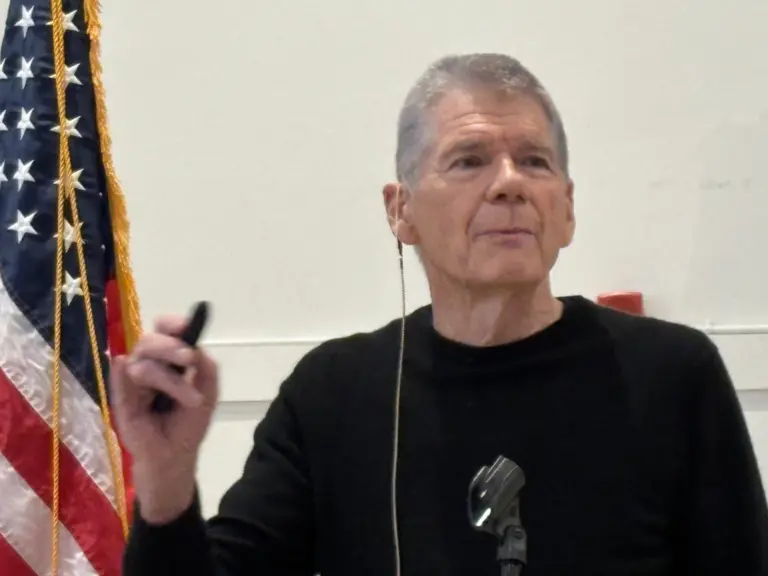By Sentinel Staff
In its preliminary ruling, the Connecticut Freedom of Information Commission determined that the Greenwich Board of Education leadership violated state law in 2024 when it held an “emergency” meeting to appoint a new member, a decision that has now thrown a year’s worth of school board actions into question and intensified calls for reform in local governance.
Commission: No Emergency, No Excuse
In a 13-page ruling issued October 10, the commission found that the Board of Education’s October 21, 2024 meeting—called with less than 24 hours’ notice to fill a board vacancy—did not meet the legal definition of an emergency. The commission concluded the board “did not act in good faith” to comply with notice requirements and that the situation did not present the “unforeseen circumstances necessitating immediate action” required by law.
The board had 94 days to address the vacancy left by Karen Kowalski’s resignation but waited until the eleventh hour, citing fears that the Board of Selectmen might exercise its statutory authority to make the appointment. The commission dismissed that justification as political, not legal, noting that the board’s actions deprived the public of their right to proper notice and participation.
Actions Now at Risk
The ruling’s implications are significant. Because the appointment was made illegally, any board actions passed by a one-vote margin in which that member cast the deciding vote could now be invalidated. That includes the controversial 5–3 vote in May 2025 to extend Superintendent Toni Jones’s contract through June 2028—a decision that may now have to be re-noticed and re-voted.
Camillo: “A Sad Chapter” in Greenwich Politics
For Camillo, the decision validates warnings The Board of Selectman has voiced for more than a year. “For the last year, the Democratic Board of Education members have doubled down on a violation of state law and tried to pin the blame on me,” he said. “They put the town through a lot of turmoil that was totally unnecessary.”
Camillo said he twice attempted to broker a compromise that would have allowed the board to correct its course “without much embarrassment or more cost to the town,” but both efforts were rejected. “This sad chapter in Greenwich governance and Greenwich politics is something that we don’t want to see ever again,” he said.
The commission’s language, particularly its finding that the board “did not act in good faith,” has emboldened those who argue the board’s actions went beyond procedural missteps. “This is really about certain Democrats and restoring civility and honesty to government,” Camillo said. “They basically ignored decades and decades of bipartisan respect and precedent.”
Dissent From Within
Republican Board of Education member Michael-Joseph Mercanti-Anthony said the outcome was avoidable if longstanding practices had been followed. “This all could have been avoided if the BOE Democrats had chosen to maintain the long-standing precedent that the party with the vacancy should have a say in the seat’s fulfillment,” he said. “Instead, they insisted on appointing the one candidate the three Republicans opposed. I called it a railroad at the illegal meeting and stand by that statement. The Board of Selectmen was right to intervene.”
A Call for Bipartisanship and Focus on Students
Camillo said the lesson from the decision is not merely legal but civic. “We need to put children first, and we can only do that by refusing to make them pawns,” he said. “The Board of Education must be a bipartisan group that represents our children, not our political parties.”
The FOIC ruling underscores a broader concern: the erosion of collaborative governance in a town long defined by bipartisan compromise. Camillo, who has often touted a record of working across party lines, said that approach remains essential. “This isn’t about political victory,” he said. “It’s about making sure that public institutions follow the law, act transparently, and honor the bipartisan tradition that has long defined this town.”
Karen Hirsh Defiant
Karen Hirsh, who called the meeting last October and who lead during the Behette appointment, sought to downplay the seriousness of the Freedom of Information Commission’s proposed ruling, describing it as a procedural clarification rather than a substantive rebuke. “The recent proposed ruling from the Freedom of Information Commission — nearly a year in the making — has resolved none of the substantive issues at hand,” Hirsh said.
The commission’s findings clearly go far beyond technicalities. In its proposed decision, the FOIC concluded that the board “violated §1-225(d), G.S., by holding [its] October 21, 2024 meeting without providing proper notice for a special meeting,” adding that the board “did not act in good faith to comply with the notice requirements of the FOI Act.”
Hirsh also claimed that “this draft ruling does not address the legality of any appointment. It only determines whether the FOIC deemed the BOE’s 10/21 meeting to qualify as an ‘emergency’ based on its definition.”
That characterization is directly contradicted by the commission’s findings. The proposed decision states that “the actions taken by the respondents only at their October 21, 2024 special meeting are hereby declared null and void.” It further notes that the board’s decision to provide less than one hour’s notice before appointing a new member “deprived the public of access to the appointment of an official who, if not for Ms. Kowalski’s mid-term resignation, would otherwise have been elected to serve by the public.”
The FOIC’s decision also underscores that the complaint was appropriately directed at the Board of Education itself, not at individual members. “The respondents are public agencies within the meaning of §1-200(1), G.S.,” the decision reads. “It is found that the respondent acting chairman is an elected official of a school district and is therefore a ‘public agency.’ Therefore, it is concluded that the Commission has subject matter jurisdiction to hear the appeal against the respondents as docketed.”
In other words, the board — as a public body — is accountable for the violation. Hirsh’s focus on who filed the complaint and how the parties were designated does little to obscure the broader conclusion: the FOIC determined the board acted unlawfully, nullified its actions, and signaled that its conduct undermined the public’s right to open government.
What Comes Next
Karen Hirsh now has the option to appeal the FOIC’s decision in Superior Court, though doing so would likely prolong a legal battle that has already cost the town time, money, and public trust. If the decision stands, any actions passed by a single vote—particularly those involving the contested appointee — will likely need to be reconsidered in properly noticed meetings.
Meanwhile, the court case over who lawfully holds the board seat remains unresolved. Paul Cappiali, appointed by the Board of Selectmen to fill the vacancy, has yet to be seated. Because he has not cast any votes, the FOIC ruling does not retroactively validate decisions he might have made. His status will ultimately be determined by the courts, separate from the commission’s findings.
For now, the FOIC’s decision serves as a clear rebuke of how Greenwich’s school governance veered off course—and a reminder, Camillo said, that “respect for the law and for each other must come before partisan agendas.”
SIDE BAR: This statement was not received in time to include it in the full article so we are including it here as it was submitted.
Statements from Hirsh “were released without consulting us and do not represent the full Board”
The preliminary ruling by the Freedom of Information Commission found that the Board of Education’s Democrats violated FOIA regulations by holding an illegal meeting.
At that meeting, Democratic members voted to appoint Jen Behette as a “Republican” member — even though she was the only candidate unanimously opposed by the actual Republican members. Nevertheless, she was forced onto the Board through a process now found unlawful.
Members Karen Hirsh, Sophie Koven and Kathleen Stowe have since issued statements filled with omissions and halftruths, attempting to spin the decision’s full condemnation of their actions. These statements were released without consulting us and do not represent the full Board.
Despite multiple legal opinions warning against their approach, these members proceeded with an “emergency meeting” that clearly failed to meet the legal standard for an emergency. Their actions were politically motivated and intended to install a pre-selected candidate, in violation of both the law and BOE precedent.
First Selectman Fred Camillo and other Town officials recognized these actions as improper months ago, which is why the Town Clerk and others lawfully recognized Paul Cappiali as the legitimate appointee. Yet Board Democrats have refused to acknowledge this.
Because of these actions and the refusal to work toward bipartisan solutions, the Board now faces the possibility that an entire year of meetings and votes may be voided. Ms. Behette should never have been appointed, and the precedent of respecting the party with a vacancy should never have been violated.
Upholding the law, transparency, and fairness protects our schools and preserves public trust. Secrecy, partisanship, and political manipulation do not.
Greenwich BOE Republican Caucus
Paul Cappiali, Cody Kittle, Michael-Joseph MercantiAnthony, Wendy Vizzo Walsh




